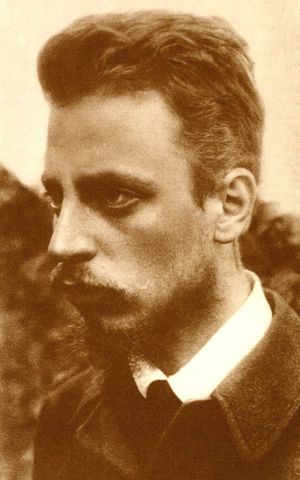Райнер Мария Рильке знаменитые цитаты
Райнер Мария Рильке цитаты
1907
Источник: Книги стихов
образ, нитка
Источник: стихи
старый дом
Источник: стихи
дерево
Источник: стихи
„Трудно высказать, сколько новизны в этой стране и сколько будущности.“
О России; из письма, 1899 год
Райнер Мария Рильке: Цитаты на английском языке
Источник: Rilke's Book of Hours: Love Poems to God
Letter Nine (4 November 1904)
Letters to a Young Poet (1934)
Контексте: All feelings that concentrate you and lift you up are pure; only that feeling is impure which grasps just one side of your being and thus distorts you. Everything you can think of as you face your childhood, is good. Everything that makes more of you than you have ever been, even in your best hours, is right. Every intensification is good, if it is in your entire blood, if it isn't intoxication or muddiness, but joy which you can see into, clear to the bottom.
“A good marriage is that in which each appoints the other guardian of his solitude.”
Источник: Letters to a Young Poet
“Someday you will name me,
then gently place those burning
holy roses in my hair.
[Songs of Longing]”
Источник: Rainer Maria Rilke - Sämtliche Werke (Complete Works)
Liebende … [w]enn ihr einer dem andern
euch an den Mund hebt und ansetzt –: Getränk an Getränk:
o wie entgeht dann der Trinkende seltsam der Handlung.
Second Elegy (as translated by Lee Siegel)
Duino Elegies (1922)
Schließlich brauchen sie uns nicht mehr, die Früheentrückten,
man entwöhnt sich des Irdischen sanft, wie man den Brüsten
milde der Mutter entwächst. Aber wir, die so große
Geheimnisse brauchen, denen aus Trauer so oft
seliger Fortschritt entspringt –: könnten wir sein ohne sie?
First Elegy (as translated by Stephen Mitchell)
Duino Elegies (1922)
Letter to his wife, reprinted in Rilke’s Letters on Cézanne (1952, trans. 1985). (October 21, 1907)
Rilke's Letters
Die nächste Flut verwischt den Weg im Watt,
und alles wird auf allen Seiten gleich;
die kleine Insel draußen aber hat
die Augen zu; verwirrend kreist der Deich<p>um ihre Wohner, die in einem Schlaf
geboren werden, drin sie viele Welten
verwechseln schweigend, denn sie reden selten,
und jeder Satz ist wie ein Epitaph
Die Insel I (The Island I) (as translated by Cliff Crego)
Neue Gedichte (New Poems) (1907)
Worpswede (1903)
Letter Two (5 April 1903)
Letters to a Young Poet (1934)
Letter Four (16 July 1903)
Letters to a Young Poet (1934)
<p>Schon ist mein Blick am Hügel, dem besonnten,
dem Wege, den ich kaum begann, voran.
So fasst uns das, was wir nicht fassen konnten,
voller Erscheinung, aus der Ferne an—</p><p>und wandelt uns, auch wenn wirs nicht erreichen,
in jenes, das wir, kaum es ahnend, sind;
ein Zeichen weht, erwidernd unserm Zeichen...
Wir aber spüren nur den Gegenwind.</p>
Spaziergang (A Walk) (March 1924)
Alternate translation:
My eyes already touch the sunny hill,
going far ahead of the road I have begun.
So we are grasped by what we cannot grasp;
it has its inner light, even from a distance—<p>and changes us, even if we do not reach it,
into something else, which, hardly sensing it, we already are;
a gesture waves us on, answering our own wave . . .
but what we feel is the wind in our faces.
Selected Poems of Rainer Maria Rilke as translated by Robert Bly (1981)
Letter Nine (4 November 1904)
Letters to a Young Poet (1934)
Erst eine Kindheit, grenzenlos und ohne
Verzicht und Ziel. O unbewußte Lust.
Auf einmal Schrecken, Schranke, Schule, Frohne
und Absturtz in Versuchung und Verlust.</p><p>Trotz. Der Gebogene wird selber Bieger
und rächt an anderen, daß er erlag.
Geliebt, gefürchtet, Retter, Ringer, Sieger
und Überwinder, Schlag auf Schlag.<p>Und dann allein im Weiten, Leichten, Kalten.
Doch tief in der errichteten Gestalt
ein Atemholen nach dem Ersten, Alten...</p><p>Da stürzte Gott aus seinem Hinterhalt.</p>
As translated by Cliff Crego
Imaginärer Lebenslauf (Imaginary Life Journey) (September 13, 1923)
Aus unendlichen Sehnsüchten steigen
endliche Taten wie schwache Fontänen,
die sich zeitig und zitternd neigen.
Aber, die sich uns sonst verschweigen,
unsere fröhlichen Kräfte—zeigen
sich in diesen tanzenden Tränen.
Initiale (Initial) (as translated by Cliff Crego)
Das Buch der Bilder (The Book of Images) (1902)
Letter Eight (12 August 1904)
Letters to a Young Poet (1934)
Je weiter ich lebe, desto nötiger scheint es mir, auszuhalten, das ganze Diktat des Daseins bis zum Schluss nachzuschreiben; denn es möchte sein, dass erst der letzte Satz jenes kleine, vielleicht unscheinbare Wort enthält, durch welches alles mühsam Erlernte und Unbegriffene sich gegen einen herrlichen Sinn hinüberkehrt.
Letter to Ilse Erdmann, 21 December 1913, in Letters on Life, U. Baer, trans. (2007)
Rilke's Letters
“Not since Moses has anyone seen a mountain so greatly.”
Quoted in Rilke's Letters on Cézanne, foreword (1952, trans. 1985)
“Young people, who are beginners in everything, cannot yet know love: they have to learn it.”
Letter Seven (14 May 1904)
Letters to a Young Poet (1934)
Letter Four (16 July 1903)
Letters to a Young Poet (1934)
Letter Seven (14 May 1904)
Letters to a Young Poet (1934)
Diese Mühsal, durch noch Ungetanes
schwer und wie gebunden hinzugehen,
gleicht dem ungeschaffnen Gang des Schwanes.<p>Und das Sterben, dieses Nichtmehrfassen
jenes Grunds, auf dem wir täglich stehen,
seinem ängstlichen Sich-Niederlassen—:<p>in die Wasser, die ihn sanft empfangen
und die sich, wie glücklich und vergangen,
unter ihm zurückziehn, Flut um Flut;
während er unendlich still und sicher
immer mündiger und königlicher
und gelassener zu ziehn geruht.
Der Schwan (The Swan) (as translated by Cliff Crego)
Neue Gedichte (New Poems) (1907)
“Slowly the evening changes into the clothes
held for it by a row of ancient trees.”
Der Abend wechselt langsam die Gewänder,
die ihm ein Rand von alten Bäumen hält.
Abend (Evening) (as translated by Cliff Crego)
Das Buch der Bilder (The Book of Images) (1902)
Letter Four (16 July 1903)
Letters to a Young Poet (1934)
Letter One (17 February 1903)
Letters to a Young Poet (1934)

